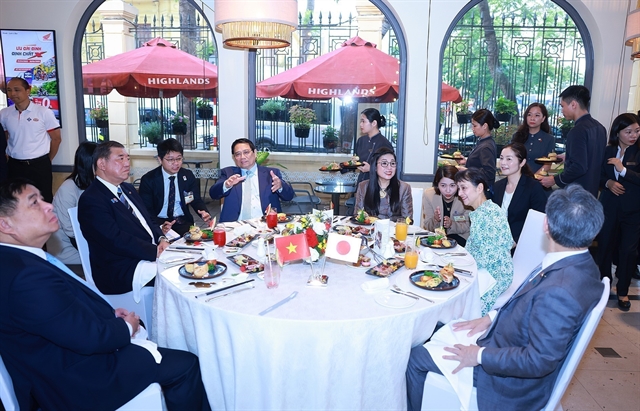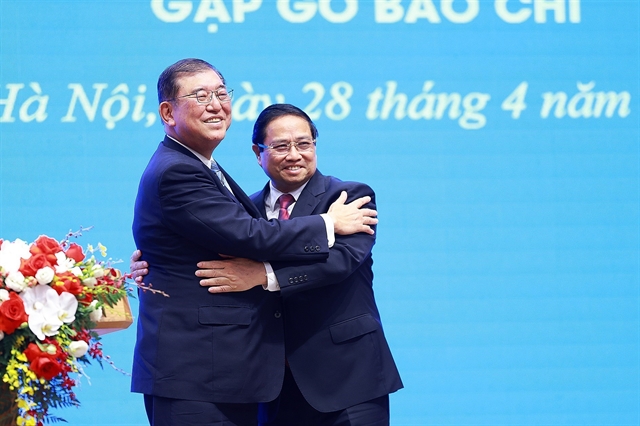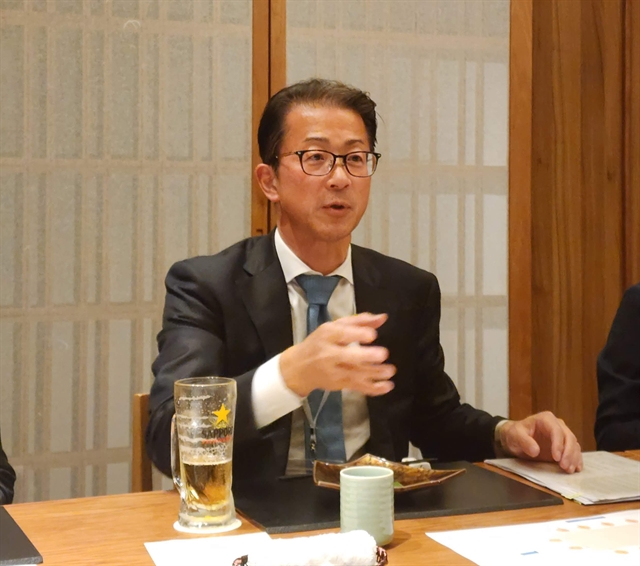 Politics & Law
Politics & Law

 |
| Japanese Prime Minister Ishiba Shigeru and Vietnamese counterpart Phạm Minh Chính at the press briefing announcing the outcomes of their official talks in Hà Nội on April 28. — VNA/VNS Photo Dương Giang |
HÀ NỘI — During meetings and talks with key Vietnamese leaders, Prime Minister Ishiba Shigeru emphasised three main pillars of bilateral cooperation: security, economics, and enhanced exchanges and coordination on regional and international issues.
Spokesperson for the Ministry of Foreign Affairs Toshihiro Kitamura made the statement on April 28 during a meeting with the local press, as the Japanese Government leader had a three-day visit to Việt Nam, first time during his capacity as PM, and the first one by a Japanese PM since Việt Nam, Japan upgraded ties to a Comprehensive Strategic Partnership in November 2023.
On security, a highlight of the visit was the two sides' agreement to establish a Deputy Minister-level Diplomatic and Defence Dialogue mechanism (2+2).
On economic matters, Japan seeks win-win cooperation, and expressed its support for Việt Nam’s development orientation in the new era put forward by General Secretary Tô Lâm. The two sides outlined very specific plans to upgrade their bilateral economic ties, especially in the fields of semiconductors, green transition, and disaster response.
PM Ishiba welcomed the "era of nation's rise" orientations as proposed by the top Vietnamese leader and stressed that Việt Nam’s economic growth holds significant importance for the overall development of the region.
PM Ishiba stated that Japan would receive approximately half of the 500 Vietnamese PhD students being trained in the semiconductor sector, and announced that a training programme in semiconductors would be launched at the Việt Nam–Japan University – a symbolic cooperation project between the two countries.
"As we may know, Japanese population is decreasing and ageing, and we need labour and intelligence from Vietnamese young people," the diplomat noted.
Many companies are still looking for the possibility of expanding investment in Việt Nam, as the recent survey suggested that Việt Nam is the second favourite destination for Japanese companies.
"I know that your government is now streamlining the government organisation, as well as the local government apparatus, and we hope that this streamlining will lead to further rationalisation of the procedures of the investment for Japanese enterprises," Toshihiro noted.
Amidst uncertainty and shakeups in current international situation, Japan is interested in establishing a reliable supply chain with friendly countries that Japan can have confidence in and that is resilient to external shocks, thus its wish to further cooperation with Việt Nam in economics and trade, the foreign ministry's press secretary noted.
In the area of green transition and energy, PM Ishiba mentioned that Japan and Việt Nam would jointly implement cooperation projects with a total scale of around US$20 billion, including support from JBIC. These will focus on the Asian Zero Emission Community (AZEC) initiative, as well as other projects such as offshore wind power, the construction of power transmission networks, and bioenergy.
As Japan itself frequently suffers from typhoons and tsunamis, the Japanese Government leader is also interested in improving Việt Nam's response to natural disasters, including both technical capacity and financial support to upgrade prevention measures in the northern mountainous regions and protection of dykes.
 |
| Japanese Foreign Ministry spokesperson Toshihiro Kitamura. — VNS Photo Trọng Kiên |
Regarding the problems facing Vietnamese trainees and a revamp of Japan's current trainee system, the foreign ministry representative remarked that the Japan's parliament has approved the new policies recently but there will be a transitional period of three years, which means a new system will be in place in 2027.
Japan is witnessing serious labour shortage, so they are trying to receive workers from Việt Nam and other countries, but training is emphasised to turn them into specified skilled workers that can permanently work in Japan, which would improve the working conditions for them as well, Toshihiro noted.
One change for example would allow foreign workers in the technical training period to switch to another workplace if they are facing abuse or are unhappy with the living/working conditions of the employing company in Japan.
Another aspect would be for Japanese authorities to work with Vietnamese counterparts to make up a registry of qualified, trustworthy intermediate agencies in Việt Nam, whose job is to match the available pool of workers in Việt Nam with the demands of companies in Japan. — VNS




